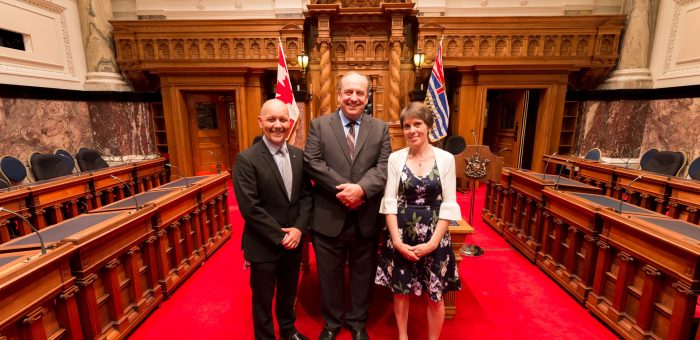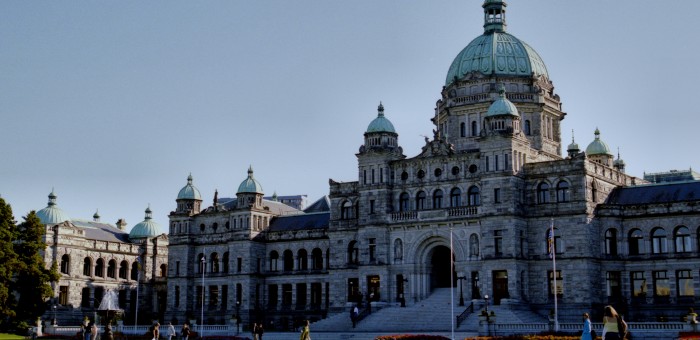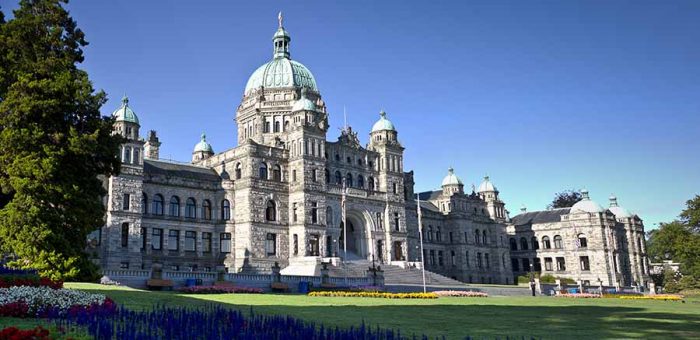Legislation
MLAs elect Steve Thomson as the Speaker of the BC Legislature
Today I released a statement congratulating Steve Thomson, BC Liberal MLA for Kelowna-Mission, on his acclamation to the role of speaker of the Legislative Assembly of British Columbia for the province’s 41st parliament.
I wish to thank him for taking on this role to serve the legislature and his fellow MLAs. I could not think of a more exceptional choice to guide the business of the legislature. Mr. Thomson has the respect of all the MLAs in the legislature and brings experience, dignity and honour to his new position.
Liberals continue to play games in BC; UK gets back to business
It’s been well over a month since the May 9th British Columbia election and the BC legislature has still not reconvened. There has been absolutely no need for the delay. The legislature could and should have been recalled in early June (as the premier stated she would) in order for the BC Liberals to test the confidence in the house. Instead, the BC Liberals continue their political calculation of delay and distraction, all the while sowing the seeds of fear within the electorate.
What’s become increasingly apparent is that to the BC Liberals, a “stable government” means one in which they can ram through any piece of legislation they want without having to engage the opposition or listen to the ideas being brought forward by others. But to most, a “stable government” is one that actually has the confidence of the house. We have an incredible opportunity before us to engage in bipartisan decision making. We have an incredible opportunity to do what we were elected to do: govern, work together, put the interests of people first. Instead, the BC Liberal games continue.
The day after the election the Premier stated “British Columbians sent a very strong message to all sides of the legislature: They want us to work together collaboratively and across partisan lines“. I agree. So let’s get on with it.
It’s time for the Premier to give British Columbians the certainty they deserve. It’s time for us to start addressing the many issues facing British Columbians on a daily basis. It’s time for all of us to treat the electorate with respect.
I thought it would be instructive to provide a timeline comparison with the recent election in the UK that also led to a minority government. I think you’ll find it very telling as to what is going on in BC. The UK have had an election, recalled parliament, elected a speaker, come together with a minority government agreement, and will read the speech from the throne as we sit on the sidelines watching the BC Liberals attempt instill fear and uncertainty in the electorate. If ever there was an example as to why after 16 years of governing it is time for the BC Liberals to be put in a time out, it is what is playing out right now in British Columbia.
BC dates and events are in Green; UK dates and events are in Blue.
The Timeline
April 11, 2017: Premier Christy Clark drops the writ and a BC Election is called for May 9, 2017.
April 18, 2017: Theresa May calls a snap election in the UK for June 8, 2017 subject to the passing of a motion to move away from their fixed election date system.
April 19, 2017: UK parliament votes 522 to 13 in support of the early election.
May 9, 2017: British Columbia general election.
May 10, 2017: Premier states British Columbians sent a very strong message to all sides of the legislature: They want us to work together collaboratively and across partisan lines“
May 29, 2017: BC Greens sign a “supply and confidence agreement“ with BC NDP.
May 30, 2017: Premier states that she will: “bring the house back in early June and made the decision to test the will of the legislature after consulting constitutional experts.“
May 31, 2017: Election writ returned to the Chief Electoral Officer.
June 8, 2017: UK general election
June 10, 2017: Theresa May signs a “supply and confidence agreement” with the Democratic Unionist Party to support a Conservative minority government.
June 13, 2017: The UK House of Commons returns and a Speaker is elected.
June 19, 2017: The Queen’s speech is to be read in the UK House of Commons (assuming that the ink dries on the goat skin in time!).
June 22, 2017: British Columbia reconvenes the legislature, elects a speaker and delivers speech from the throne.
June 26, 2017: Earliest possible day that a confidence motion could pass.
At the end of the day, the BC Liberals are in the drivers seat in determining the date on which confidence is tested. I look forward to more clarity being given in this regard.
It’s time for the Premier to give British Columbians the certainty they deserve
Over the last few weeks there have been many political pundits, reporters and commentators speculating as to what will transpire when the BC Legislature sits on June 22. Some have questioned how a stable government could be maintained with such a slim majority of seats.
Below I outline what should transpire if the Premier lives up to her word that she plans to follow constitutional and parliamentary convention. Without any doubt, there are procedural opportunities for shenanigans to occur. But these would most certainly go against constitutional and parliamentary convention and practice.
First I note that last Sunday, Adam Olsen, Sonia Fursteneau and I penned an opinion piece in the Times Colonist pointing out that in the days following the election, all three political parties acknowledged that the result presents an historic opportunity to do politics differently. We further outlined the reasons why, faced with the responsibility of determining which of the other two parties we would support in forming this government, our lengthy discussions with both parties led us to come to an agreement with the B.C. NDP — an agreement that will provide stability while enabling collaboration across party lines. We are excited by the opportunity of working with MLAs on both sides of the house to uphold our commitment to serve the people of B.C. who elected us.
Part 1: The Speaker
Let’s take a look at constitutional and parliamentary convention.
Section 37 of BC’s Constitution Act states:
(1) On its first meeting and before proceeding to business, the Legislative Assembly must elect one of its members to be Speaker.
Now longstanding parliamentary practice in British Columbia is that the Speaker is put forward by government and subsequently elected in due course. But as also noted in Section 37,
(2) On being confirmed by the Lieutenant Governor, the election of a Speaker under subsection (1) is effective until the general voting day for the next general election, or until the Speaker dies, resigns the office by writing addressed to the Lieutenant Governor, or ceases to be a member of the Legislative Assembly.
The Constitution Act also enables parliamentary convention in British Columbia for the government to provide a Deputy Speaker and for the Official Opposition to provide an Assistant Deputy Speaker.
Following convention, and as indicated in Section 37 of the Constitution Act, the Speaker would be expected to stay in place until the general voting day of the next general election. The Deputy and Assistant Deputy Speakers can be changed at every session of the legislature.
This is an absolutely critical first point.
The Premier wants to follow convention by testing confidence in the house instead of stepping down and asking the Lieutenant Governor to see if the BC NDP can form a government that has confidence of the house (which it would in light of our accord). I respect that this is her prerogative. However, in light of accord, the Premier could have simply stepped down and asked the Lieutenant Governor to approach Mr. Horgan to see if he could gain the confidence of the house. She chose not to do this.
In appealing to convention, the Premier should also allow a speaker from her party to be elected and that Speaker should be in place until the general voting day for the next general election. Failing to do so would be hypocritical and would amount to political shenanigans.
In addition, if an elected Liberal speaker were to subsequently resign because government fell on a confidence vote, it would deemed highly unusual and would point to BC Liberal political games. Frankly, it should be viewed as nothing more than a cynical act of desperation.
I reiterate that a speaker is elected until the next election and does not arbitrarily resign because he or she desires to play partisan political games. Resignation typically only occurs when scandals erupt like in the UK in 2009 or Australia earlier this year, due to illness, or in a case where the Speaker is moving to take up a cabinet position. In fact this was the case in all prior Speakers resignations from the BC Legislature that I have looked into: Dean Smith (Social Credit; 1976–1978), Harvey Schroeder (Social Credit; 1979–1982), John Reynolds (Social Credit) (1987–1989), Joan Sawicki (NDP; 1992–1994), Laurence Dale Lovick (NDP; 1996–1998) and Gretchen Mann Brewin (NDP; 1998–2000).
It would be deemed highly unusual and totally inappropriate for a speaker elected next week to suddenly resign after a throne speech confidence vote failed. In fact, in the UK a Conservative speaker was subsequently elected in 2009 (during a Labour government) and has remained speaker ever since.
In Canada, Liberal Peter Milliken was first elected as Speaker in January 2001 when Jean Chretien was Prime Minister. He was reelected several times through successive Conservative and Liberal majority and minority governments. Upon retirement in 2011, he was Canada’s longest serving speaker. Milliken was widely praised and highly regarded by MPs from both sides of the house.
Another Canadian precedent-setting example can be found following the 1925 general election. That election resulted in the Liberals under William Lyon Mackenzie King winning 99 seats, the Liberal-Conservative party under Arthur Meighen winning 116 seats, the Progressive Party of Canada under Robert Forke winning 22 seats and 8 other seats going to Labour, United Farmers of Alberta and other independent candidates. In the previous (1922) general election won by the Mackenzie King Liberals, Rodolphe Lemieux was elected speaker of the house. He was re elected Speaker in 1925.
Following the 1925 general election and despite having fewer seats, Mackenzie King formed a minority government with the help of the Progressive Party of Canada. But shortly thereafter, a major bribery scandal emerged and a subsequent motion to remove censure from a non confidence motion was defeated. Prior to the vote, Mackenzie King had approached the Governor General (Lord Julian Byng) and asked him to dissolve parliament so that a general election could be held. Lord Byng declined and instead asked Arthur Meighen to see if he could form government. Meighen was indeed able to form government.
What’s important about this so-called King-Byng affair, was that during this entire time, Rodolphe Lemieux remained Speaker of the House. In fact he remained in this position until 1930. As the government changed from a Liberal majority, to a Liberal minority to a Conservative-Liberal minority and then back to Liberal majority.
In summary, the issue of electing a speaker should not be controversial at all. The Premier has committed to follow convention and that convention is quite clear. A BC Liberal who has the confidence of all sides of the house should be available to be elected as a speaker next week and that Speaker should be prepared to remain in place for the next four years.
Part 2: The Throne Speech
Once a Speaker is in place, the Lieutenant Governor will read the Speech from the Throne prepared by the BC Liberals. The practice is to debate the Speech from the Throne for four consecutive days if a budget is to be introduced. In British Columbia it would be considered unusual if bills were introduced and subsequently debated at second reading during these first four days.
It is also possible to both amend and sub-amend the throne speech. This is precisely what was done in Ontario in 1985 when Frank Miller’s conservative minority government was defeated and replaced by a minority Liberal (led by David Peterson) / NDP (led by Bob Rae) minority government.
The motion for an address in reply to the June 4, 1985 throne speech of the Lieutenant Governor was amended (on June 7) by David Petersen by adding following words:
“That it is our duty to respectfully submit to Your Honour that Your Honour’s present government does not have the confidence of this House.“
Immediately after David Petersen moved his amendment, Bob Rae rose to speak and introduce a subamendment. He added the following to the end of the previous amendment:
“since the Miller Conservative government, even while borrowing frantically from the policies of other parties, has failed to provide progressive leadership for Ontario, and failed to deal with the major challenges facing the province; and since it is the responsibility of this Legislature to reflect the democratic will of the people as expressed in the election of May 2, 1985.”
On June 18, the 8th day the legislature sat, the subamendment, amendment and motion (as amended and subamended) all passed. The government had lost a confidence vote and the Lieutenant Governor then asked Liberal David Petersen to attempt to gain the confidence of the house, which he did when the legislature resumed two weeks later (July 2, 1985).
In theory, this is how things should play out in the BC Legislature. But the question is whether the premier was sincere when she claimed “British Columbians sent a very strong message to all sides of the legislature: They want us to work together collaboratively and across partisan lines“, or whether this was just empty rhetoric.
The BC Greens, for which I am leader, have always said that we want to do politics differently and that we will work across party lines.
While we will collaborate on many issues with the NDP government, we will remain a distinct caucus. There are many other policy areas where the Greens will advance ideas not shared with other parties. Our caucus ran on a bold, principled platform with a strong vision for B.C., and we will work hard to implement its best ideas.
We will also consider legislation proposed by the other opposition caucus, the B.C. Liberals, and support their bills if we believe they are in the best interests of British Columbians.
In the previous government, we worked with the Liberals to advance legislation to require that post-secondary campuses develop sexual assault policies. Together, we also banned employers from requiring their employees to wear high heels. These examples prove that when we work together across party lines to advance the interests of the people we all serve, government is at its very best.
But before all of this can happen, a new government must be formed.
Part 3: Games that could but should not be played
What I outlined above is convention as to how the first session of the legislative should play out. But the recent actions by the BC Liberals suggests that they might be willing to play partisan games in a desperate attempt to hold onto power.
The first partisan game would be to insist that a BC Liberal elected speaker should resign. As I outlined above, that would be highly unusual.
An additional trick that could be played would be for the BC Liberals not to put the throne speech on the order papers for four days thereby breaking a longstanding tradition. The Standing Rules in British Columbia require any amendments to the address in response to the Throne Speech be dealt with on that fourth day. By only debating the throne speech for three days, these would never be voted upon.
At this point the BC Liberals could start introducing bills and attempt to govern in the absence of a confidence motion. The next opportunity for a confidence would be the budget. And that doesn’t have to be in place until the end of the summer.
The Premier has chosen a specific path forward and here we stand 36 days after our election and she has still not clarified specifically how and when she will test the confidence of the house, despite the existence of a signed accord between the BC Greens and the BC NDP. While we have been waiting, the UK has undergone an election campaign, put in place a speaker, reconvened parliament with a minority government and the queen will deliver her speech in a few days.
While Britain very briefly delays the opening of the parliament after their election because of their longstanding practice of printing the Queen’s speech on goatskin, in British Columbia, the delay is purely because of political calculation by the BC Liberals.
It’s time for the Premier to give British Columbians the certainty they deserve. It’s time for us to start addressing the many issues facing British Columbians on a daily basis. It’s time for all of us to offer respect to the electorate.
Comment: Green Party sees chance for a new era in B.C. politics
As published in the Times Colonist on Sunday, June 11th.
On June 22, 87 MLAs will take their seats in the legislature. Some are returning to serve their sixth or seventh term, and many others are just beginning their first. All will serve in a new era of B.C. politics.
British Columbians voted for a minority government, with the B.C. Greens holding the balance of power. In the days that followed, all three parties acknowledged that this presents an historic opportunity to do politics differently.
The results of this election are a clear opportunity to break with the bad habits of the past — political calculation, polarized debates and cynical decisions that prioritize the interests of big-money donors — and to work together to put forth good public policy that will make a difference in the lives of British Columbians.
In order to make these changes a reality, British Columbia needs a stable government. The Green caucus was faced with the responsibility of determining which of the other two parties we would support in forming this government. After lengthy discussions with both parties, we came to an agreement with the B.C. NDP that will provide stability while enabling collaboration across party lines.
Our agreement is based fundamentally on the principle of “good faith and no surprises.” We made this basis of our agreement not only to ensure that we can maintain a stable minority government for four years, but also so that this stability is founded on trust and collaboration.
The principle of good faith and no surprises has enabled minority governments from New Zealand to Scotland to collaborate to enact good public policy.
If all MLAs honour their commitment to work together, it will work for B.C., too.
This begins with a new way for developing policy. Under our agreement, the NDP is required to consult with our caucus as it crafts policy. Through these consultations, we will evaluate their proposals and provide input so that it can earn our support. There will be times when we support legislation introduced by the NDP, and times when we do not, because we will evaluate each bill on an issue-by-issue basis.
Our agreement identifies many areas where we agree on principle, from banning donations of big money, to reforming our electoral system, to reinvigorating our forestry sector, to making sure our children have the public education resources they need to succeed.
British Columbians can expect to see action on these issues in the early days of their new government.
While we will collaborate on many issues with the NDP government, we will remain a distinct caucus. There are many other policy areas where the Greens will advance ideas not shared with other parties. Our caucus ran on a bold, principled platform with a strong vision for B.C., and we will work hard to implement its best ideas.
We will also consider legislation proposed by the other opposition caucus, the B.C. Liberals, and support their bills if we believe they are in the best interests of British Columbians.
In the previous government, we worked with the Liberals to advance legislation to require that post-secondary campuses develop sexual assault policies. Together, we also banned employers from requiring their employees to wear high heels. These examples prove that when we work together across party lines to advance the interests of the people we all serve, government is at its very best.
But before all of this can happen, a new government must be formed.
Christy Clark, as leader of the incumbent government, has indicated that she would like to follow protocol and test the confidence of the house with a throne speech. The first step in following protocol is to elect a Speaker from the government. If the premier is serious about following protocol and working together across party lines, the Liberals will put forward a Speaker and introduce a throne speech in a timely manner.
The Green caucus will honour our agreement with the NDP and support them in forming government.
The first sitting of the house presents an opportunity, perhaps once in a lifetime, to do politics differently. We look forward to working with our colleagues on both sides of the house to uphold our commitment to serve the people of B.C. who entrusted us with their vote.
Andrew Weaver, Sonia Furstenau and Adam Olsen are the three members of the B.C. Green caucus.
Weaver’s initiative to ban mandatory high heels passes
Weaver’s initiative to ban mandatory high heels passes
April 7th, 2017
For immediate release
VICTORIA B.C. – Last month on International Women’s Day, MLA Andrew Weaver tabled a bill that would ensure employers do not set varying footwear requirements for their employees based on gender, gender expression or gender identity. As a result, for example, this bill would prevent employers from requiring select employees to wear high-heeled shoes in the workplace.
“When I first tabled this bill it went viral and received media coverage around the world. Forcing female employees to wear high-heeled shoes, especially when their male colleagues are wearing flat shoes, is archaic and this change is clearly overdue,” said Weaver.
Today Weaver, leader of the B.C. Green Party, welcomed the news that the government has amended the Occupational Health and Safety Regulation under the Workers Compensation Act to include that “potential for musculoskeletal injury” must be considered in determining appropriate footwear.
“Over the last month, my office has been inundated with messages from people in countless sectors sharing their experience of being forced to wear heels at work. Waiters, bartenders, lawyers, people in the retail and hospitality industry wrote in to my office. I have even heard from people who work within the B.C. Legislature! They talked about sexism, objectification, bleeding feet, sore knees, hips, and backs, long term damage, and called for this practice be officially changed.”
“We are very far from an inclusive, gender-equal province. But this is an important step (taken in work-appropriate shoes of our choosing) in the right direction.” said Weaver.
– 30 –
Media contact
Mat Wright, Press Secretary
+1 250-216-3382 | mat.wright@leg.bc.ca








